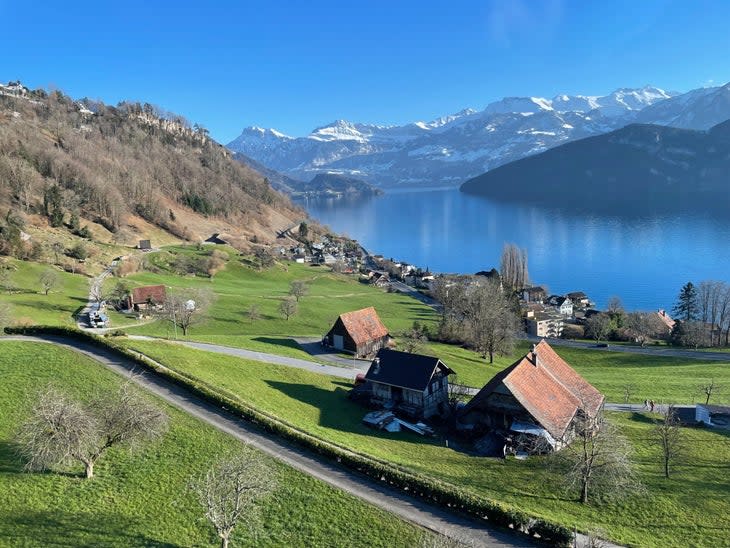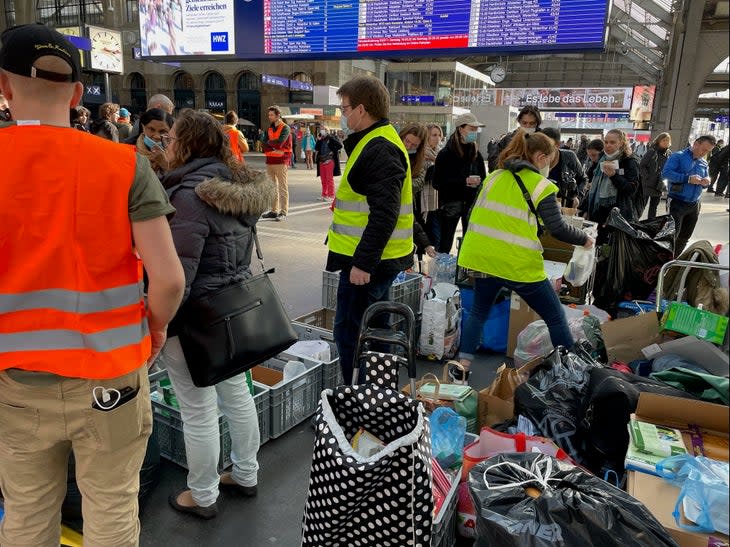I Run to Process What Ukrainian Refugees Teach Me
This article originally appeared on Trail Runner
I might start at the Ukrainian refugee asylum center in Switzerland, where I work, or the base of Mount Rigi towering down the road, or from the market after grabbing food to cook my three kids' dinner. Each time I start, I run with the goal of departing for a little while, going faster than my problems, faster than the stream of refugees whose stories run through me.
When Ukrainian women arrive in my idyllic canton in Zug, they often express gratitude. Here at the refugee center where I volunteer and help organize a free clothing and supply shop, they receive not just food and shelter, but stacks of carefully chosen items neighbors have donated. In a new alpine lake setting, these refugees describe a stark contrast to war.

''Thank you for your big hearts,'' one refugee said recently in a text to volunteers. I've met displaced people from all over the world after years of working at other asylum centers. Often it's their hearts that are bigger than most I've known.
As they process their new label "refugee," I see how it is their courage that brought them away from danger and oppression and into a safer country. It is this same courage, coupled with endurance, that maintains their individual identities.
Refugees in Switzerland step off trains in colorful lines of sizes and shapes. They wear shoes and pull suitcases that look like mine, but theirs are worn by a journey barely describable. That journey is best understood by looking into their eyes and listening to their stories.
''I had to leave my husband, my job, my home,'' one refugee texted me.
''Those who witnessed the mass death of people, the neglect of the value of human life in their homeland, experience severe psychological problems.'' another texted.
RELATED: Inside The War – Dispatches From A Ukrainian Race Director
After meeting one, two, or twenty refugees, I need to process what I've witnessed. Out on the trail, I try to run beyond what I can't immediately fix: war, suffering, and inhumane politics. Instead I run while honoring the mothers I've met who have led their children through places where there is no safe place to simply run for the joy of it.
Once on the trail, I sweat out stories of people, whose names I now know, chased by bombs and artillery fire with their children beside them. I go on until I reach the rugged Swiss Wanderweg, the rocky path rolling over foothills, the fields of wildflowers that provide a small moment of hope. If I pace myself, my sense of powerlessness no longer matters. Instead, my awareness of a shared heartbeat fills the gaps.
I've met displaced people from all over the world after years of working at other asylum centers. Often it's their hearts that are bigger than most I've known.
My breath calms as I summit a steep ascent. Shadows and light mix with leaves underfoot. I find strength and endurance among the chestnut and wild cherry trunks – strength I'll carry home. The freedom to race among birdsongs and distant church bells squashes the fear that wars never end.
With each exhale my sight clears. Refugee stories rise for a moment into a clearing. Pain and grief shift about two miles up, highlighting every survival story's lesson. Peace grows. It grows through the pain of the long run, of finding a place to rest somewhere.
The trails are marked so well in Switzerland, forever pointing toward something safe and spectacular. In one direction, there will be a Hutte, an Alpine inn, waiting among green slopes for those who want shelter, warmth, a bed, and food. In another direction, there's a village where visitors recline on sunny decks, sipping spritzers before heading back down.
I choose the middle trail, a lesser-marked destination. My torso parallels a steep ascent while I process what I've heard and seen. ''It feels like I died and reached heaven,'' one young refugee woman told me an hour after her arrival at the asylum center. She wants to run with me soon, she said. But for now, she needs to stare at the glassy Zugersee lake and be still.
The canyon between our ''Swiss bubble'' and the smoldering landscape of Ukraine where friends, family, and mothers still hide with their kids feels like the distance beneath the lake bottom and its surface. It is only reachable by imagination, the media, or stories from refugees themselves.
"It was impossible to stop, even for a minute, because every minute could cost us our lives, and when you have small children with you, you understand that you are obliged to save them and move on, despite fatigue, both moral and physical,'' one refugee texted me.

Around the fourth mile, I'm closer to the peak of my run. My mind is full of Ukrainian children about to start at a new school in a new country with a new language. They have war in their minds. But still they smile, aware of everything left that's good. They're survivors who braid dandelion wreaths, plant sunflower seeds, and race around the dining hall.
RELATED: Running Toward Change
On a run, perhaps we all fly into the unknown. Our muscles and minds process pain that feels endless until we warm into a trail that leads us somewhere else. We move through shadows, sometimes blending with them, assured that light will come from somewhere. We are reminded that we are small, that pain is only a symptom of living.
"It was impossible to stop, even for a minute, because every minute could cost us our lives, and when you have small children with you, you understand that you are obliged to save them and move on, despite fatigue, both moral and physical,'' one refugee texted me.
As I head back down the trail, finding my way back, I feel different. I'll never understand how it feels to be an asylum-seeking refugee. I'll never be as strong as the refugees I've met.
''Many of us have never even left our homeland,'' one refugee said. And yet she ran from her home, trusting that someone, somewhere would welcome her. She and others ran toward an indefinite end, often with one pair of shoes, their children, and their hearts.
I can't think of a more courageous reason to run.
Amy Aves Challenger is a writer, artist, and co-founder of a volunteer organization to empower refugees by providing necessary supplies, amplifying their personal stories, and connecting them to their international community in Switzerland. She received a grant via the Schusterman Foundation to provide creative writing workshops to 24 refugee women and girls across Europe.
For exclusive access to all of our fitness, gear, adventure, and travel stories, plus discounts on trips, events, and gear, sign up for Outside+ today.

